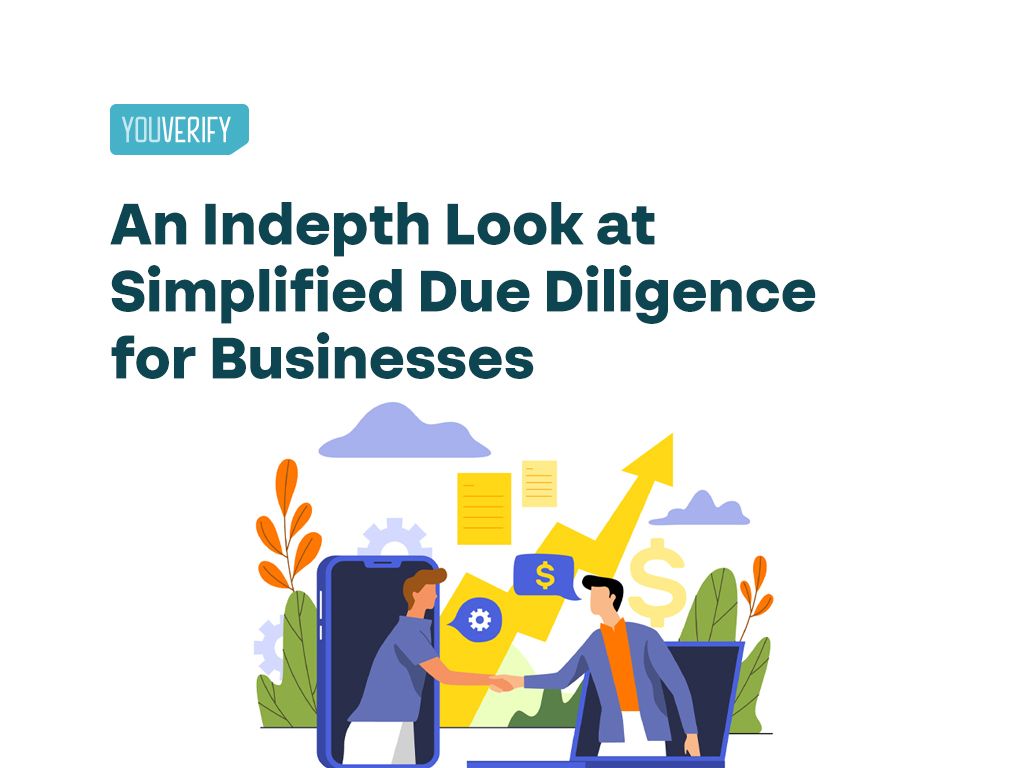Knowing a customer is important for guarding against certain business risks and satisfying compliance requirements. Know Your Customer (KYC) is a vital step in satisfying due diligence requirements at several levels. However, there are three levels of customer due diligence that requires varying levels of identity verification and background checks by the business. This article takes a deep look at Simplified Due Diligence (SDD) for businesses.

What are the three levels of Due Diligence?
Basically, there are three levels of customer due diligence: simplified due diligence, standard or customer due diligence, and enhanced due diligence. Let's take a look at each individual type:
1. Simplified Due Diligence (SDD)
What is simplified due diligence? Simplified due diligence is the lower level of customer due diligence that is conducted on an individual that poses a low risk of money laundering or an act of terrorist financing. first step is to follow your simplified due diligence checklist to help simplify the process. In Simplified Due Diligence, the individual poses a lower risk than Standard Due Diligence and far less risk than customers in the Enhanced Due Diligence category.
2. Standard Due diligence or Customer Due Diligence (CDD)
Standard due diligence, or Customer Due Diligence is the level of customer due diligence that is mostly applied in general situations. This specifically means when there is a potential risk of money laundering or terrorist financing, but such risk is minimal and there's only a small probability that it would be realized. Basically, the standard or customer due diligence process helps you identify your customer and verify their identity.
3. Enhanced Due Diligence (EDD)
This is the process of carrying out a thorough investigative assessment of a high-risk customer to identify and mitigate such risks. Enhanced Due Diligence is specifically designed for high-net-worth or high-risk customers that pose great risks to the financial sector. Beyond investigation, such individuals are heavily monitored and regulated to ensure there is no money laundering, terrorist financing, or cyber fraud going on. Examples of such customers are those from high-risk countries, Politically Exposed Persons (PEPs), countries under sanctions, etc.
Read Also - Enhanced Due Diligence Checklist - Everything You Need To Know
What is Simplified Due Diligence?
Simplified due diligence (SDD) is the lowest level of due diligence that can be carried out on a customer. What is SDD? It is the abbreviated word for simplified due diligence. SDD is carried out when there is a slight opportunity of the customer getting involved in terrorist financing or money laundering activities.
After establishing the fact that a customer falls into the simplified due diligence category, the next step is to prepare a simplified due diligence checklist to help identify the customer. Basically, SDD does not require that you verify the identity of the customer compared to standard and enhanced due diligence. However, the business-customer relationship should be continuously monitored for risky trigger events that may require a higher level of due diligence process.
When is Simplified Due Diligence required?
Simplified due diligence is necessary for identifying possibly harmless customers that may prove not to be in the near future. It is the step where you establish the customer risk profile after taking into account your risk assessment procedures.
Simplified due diligence does not require customer screening or identity verification and is mostly applied when you can prove that the risk of terrorist financing and money laundering is low.
INTERESTING READ: Digital Identity: A Complete Guide in 2025
What is the difference between Simplified Due Diligence and Enhanced Due Diligence?
The major difference between Simplified Due Diligence (SDD) and Enhanced Due Diligence (EDD) is the fact that simplified due diligence is a less strict customer verification process, as it only requires the basic information from customers, like their name, address, and a valid means of identification.
However, enhanced due diligence is carried out on customers with established high-risk profiles as well as their close relatives. This is because they have higher tendencies to be exposed to terrorist financing and money laundering activities.
Achieving Simplified Due Diligence With Youverify OS (YV OS)
With Youverify’s flagship product that allows businesses to perform digital KYC in a matter of seconds.
Here is a video description of how it works:
You can now onboard customers and complete KYC using just their mobile phone numbers. Keep in mind that it has to be the phone number linked to their bank account and NIN. By collecting their phone numbers, our “Advanced Search” can help you retrieve other relevant information like their NIN, BVN, and full data.
The implication is that businesses and organizations can now onboard customers with just their phone numbers and complete KYC with full compliance. This greatly transcends the current use of customers' phone numbers for only user authentication like OTP.
Advanced Search is available on our flagship product, YV OS, and only available to customers in compliance with Nigeria Data Protection Regulation (NDPR).
Book a demo session today to see how youverify can help automate your business’s KYC Due Diligence!
Bottom Line
Simplified Due Diligence is the most foundational aspect of due diligence requirements and is useful for establishing a customer risk level. As a business, constant monitoring should be performed for customers in the SDD category in case there is a need to conduct higher due diligence when the situation warrants it.
